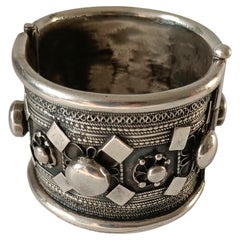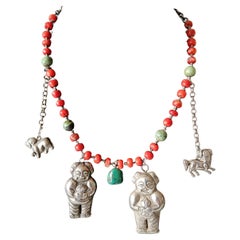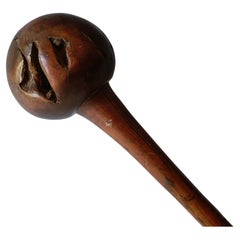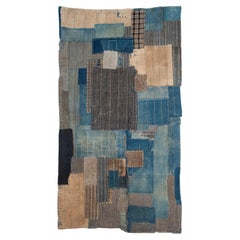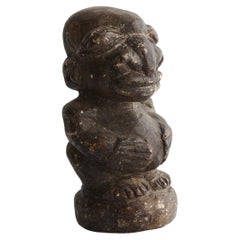19th Century Tribal Art
to
12
110
88
215
4
1
44
215
1,126
29
446
437
78
8
4
20
28
19
33
33
22
18
4
104
62
36
20
19
91
80
75
33
25
215
215
215
5
3
2
1
1
Period: 19th Century
Superb Heavy Tribal Silver cuff bracelet Somalian African Tribal
Located in London, GB
A superb heavy tribal bracelet from the Horn of Africa, attributed to the Ethiopian, Somali, or Nubian regions. Crafted from high-grade silver, this substantial piece is richly decor...
Category
Somali Antique 19th Century Tribal Art
Materials
Leather
Rare Antique Qing Dynasty Chinese Ethnic Minority silver Coral necklace
Located in London, GB
A beautiful rare Antique Qing Dynasty Chinese Ethnic Minority silver Coral turquoise necklace from Yunnan.
A superb chain necklace with added Taoist charms with turquoise and fine r...
Category
Chinese Antique 19th Century Tribal Art
Materials
Coral, Silver
Fiji Ula Club Polynesian war club Tribal Oceanic Antiques
Located in London, GB
Fiji Ula Club Polynesian war club Tribal Oceanic
A good antique Fiji Ula throwing club
With naturally occurring root fissures on the ball head
Good condition with minor age cra...
Category
Fijian Antique 19th Century Tribal Art
Materials
Hardwood
Rare Antique Japanese Oversized Sleeping Kimono (Yogi)
Located in Point Richmond, CA
Rare Antique Japanese Oversized Sleeping Kimono (Yogi)
This is the outer shell of a type of shaped sleeping kimono known as a yogi. Yogi were in more common use during the Edo and M...
Category
Japanese Meiji Antique 19th Century Tribal Art
Materials
Cotton, Linen
Antique Japanese Recycled Boro Patchwork Futon Cover
Located in Point Richmond, CA
Antique Japanese Recycled Boro Patchwork Futon Cover
This indigo-dyed patchwork boro futon cover is a physical testimony to the determination and resourcefulness of those living in ...
Category
Japanese Meiji Antique 19th Century Tribal Art
Materials
Cotton
Nomoli - Carved Stone Figurine, Kissi People, Sierra Leone, 19th Century
Located in Aramits, Nouvelle-Aquitaine
A Nomoli is a carved stone figurine native to Sierra Leone and Liberia. They are usually made of soapstone, limestone, or granite.
The carving depicts a man holding his belly with a...
Category
Sierra Leonean Tribal Antique 19th Century Tribal Art
Materials
Stone, Soapstone
Antique Tibetan Gau Box Silver Turquoise pendant necklace
Located in London, GB
Ga`u Box necklace with silver with Turquoise inlay with coral and turquoise beads
All Tibet/ Himalaya mid 20th century
Category
Tibetan Antique 19th Century Tribal Art
Materials
Brass
Early 20th Century Brazilian Metal Hanging Amulet 'Penca de Balangadas'
Located in Barcelona, ES
Early 20th Century Brazilian Metal Hanging Amulet 'Penca de Balangadas' – Circa 1890
Discover the captivating history behind this early 20th-century metal hanging amulet, known as '...
Category
Brazilian Tribal Antique 19th Century Tribal Art
Materials
Brass
Large Tibetan Chest with Hand-Painted Front
Located in Point Richmond, CA
Large Tibetan storage chest with traditional hand painted Dragons
Tibet
Wood, Iron, Paint
19th century.
27 x 59.5 x 22.5 in./ 69 x 151 x 57
Height on custom display St...
Category
Tibetan Other Antique 19th Century Tribal Art
Materials
Iron
Nepal Wood Dance Mask with Open Mouth Teeth, Late 19th Century
Located in Point Richmond, CA
Oval dance mask from Nepal with powerful expression, open eyes and oval mouth with finely carved teeth, nicely carved ears. Heavy black encrusted patina inside and out from tradition...
Category
Nepalese Tribal Antique 19th Century Tribal Art
Materials
Wood
Oman, Silver & Gold Necklace with Amulet Box, 19th Century
Located in PARIS, FR
Stunning and rare Omani tribal necklace in gold and silver featuring eight Burgau thalers dated 1780 and a large amulet box (Hirz) also in gold and silver. 19th century.
Very good condition. Preserved and professionally framed.
Dimensions of the necklace: 52 x 30 x 3
Dimensions of the frame: 70 x 47 x 5
Secure shipping.
This fine Omani necklace of silver and gold comprises two strands of spiky, seed pod-like silver beads; gold-wrapped beads; eight silver Maria Theresa thaler coins; and a large silver and gold amulet box, with multiple chain tassels each of which finishes with a square-shaped pendant cut from sheet silver.
The cigar-shaped amulet box called hirz would have contained some Koranic verse or religious text.
Such a spectacular display of wealth would only have been worn at times of important festivities such as marriage celebrations.
Maria Theresa thalers were made in Austria since the reign of Empress Maria Theresa of the Austro-Hungarian Empire. The Empress died in 1780 and since that time, all thalers that were subsequently struck were minted with that date regardless of the actual year that they were produced. The coins achieved such a level of trust for their silver content (which is 83.3% silver) in the Middle East that neither the design not the date was varied, and so for more than 200 years the coins were used as an international currency among the tribes and the states of the Middle East, in much the same way as the Spanish dollar was used as an international currency at the time elsewhere. The thalers were used to complete most important transactions locally and were also given as dowries. They were also an important source of silver and were melted locally for jewellery.
The coins made their way to the ports of the Red Sea, Egypt and northern Africa from the ports of Genoa, Trieste, Livorno and Marseille. European traders used the coins to buy precious materials from the Gulf and northern Africa which it desired – commodities such as spices, coffee, gum Arabic, indigo, pearls, and tortoise shell.
The importance and the beauty of the coins saw them incorporated into local jewellery most particularly in Oman and Yemen.
References
Al-Jadir, S., Arab & Islamic Silver, Stacey International, 1981.
Harrigan, P., ‘Tales of a Thaler’, Saudi Aramco World, January/February 2003.
Hawley, R., Omani Silver, Longman, 1978.
Hawley, R., Silver: The Traditional Art of Oman, Stacey International, 2000.
Rajab, J.S., Silver Jewellery of Oman, Tareq Rajab Museum, 1998.
Ransom, M., Silver Treasures from the Land of Sheba: Regional Yemeni Jewelry...
Category
Omani Antique 19th Century Tribal Art
Materials
Gold, Silver
Kota Reliquary Figure Gabon, Christies Provenance
Located in Sharon, CT
Kota Reliquary of classic form. Brass and iron over wood. On an old base, with an old number label. Ex Estate of Willliam Kohler, Christies NY 'Important Tribal Art' Nov 20 1997.
Category
Gabonese Primitive Antique 19th Century Tribal Art
Materials
Brass, Copper, Iron
Wood and Brass Antique 19th Century Middle Eastern Camel Seat Saddle
Located in North Hollywood, CA
Antique, 19th century Asian Middle Eastern collector two person wooden camel saddle with ornate brass mountings and iron reinforcements.
19th Century Midd...
Category
Egyptian Arts and Crafts Antique 19th Century Tribal Art
Materials
Brass, Iron
Australian boomerang, 19th century
Located in 'S-HERTOGENBOSCH, NL
A 19th century boomerang from Australia.
Good patina and presented on a stand.
Category
Australian Tribal Antique 19th Century Tribal Art
Materials
Wood
Ethiopian Procession Cross: A Sacred Heritage and Craftsmanship
Located in Ixelles, BE
Ethiopian Procession Cross: A Sacred Heritage and Craftsmanship.
Structure and Composition: This finely crafted Ethiopian procession cross is rich in iconographic detail. Constructed from metal, likely bronze or brass, it features a complex structure with several decorative elements.
- Central Part:
• Madonna and Child: At the heart of the cross is a depiction of the Virgin Mary holding the Child Jesus. This central image is framed within a circle adorned with openwork motifs and small inlays that appear to be precious stones or colored glass pieces.
Arms of the Cross:
• Angelic Musicians: Each lateral arm of the cross features an angelic musician, playing instruments and depicted in a flying position. The angels are finely detailed, with spread wings and carefully sculpted garments.
• Cherub: At the apex of the cross, a cherub is depicted, a celestial being with multiple wings and surrounded by cloud-like motifs.
• Bird Motifs: The lower extremities of the cross are adorned with bird motifs, likely doves, symbolizing peace and the Holy Spirit, placed within openwork circles.
Base and Handle:
• Engraved Base: The base of the cross, which serves as a handle, is also richly engraved with floral and geometric motifs, providing a sturdy and decorative grip for processions.
History of Ethiopian Procession Crosses
Origins and Evolution: Ethiopian procession crosses have a long history, dating back to the introduction of Christianity to Ethiopia in the 4th century under King Ezana. Influenced by Coptic and Byzantine traditions, these crosses evolved to adopt a distinctive style unique to Ethiopia.
- Characteristics:
• Style and Iconography: Ethiopian crosses...
Category
Ethiopian Primitive Antique 19th Century Tribal Art
Materials
Brass
Marroquin Arab 1870 Koummya Dagger With Sheath In Wood Silver And Brass
Located in Miami, FL
Marroquin forged steel dagger with sheath.
Beautiful koummya dagger with a sheath from the region of Morocco, circa 1870. The blade was created with forged steel, mounted in wood and brass and embellished with silver parts decorated with chiseled and engraved motifs. The dagger is curved with a tick double edge blade, the handle is ornate with silver and wood. Like swords and daggers in most cultures, the Islamic dagger...
Category
Moroccan Islamic Antique 19th Century Tribal Art
Materials
Silver, Sterling Silver, Brass, Steel
$1,588 Sale Price / set
20% Off
African Carved Wood "Tree of Life" Sculpture
Located in Chicago, IL
Beautiful, impressively sized and elaborately carved "Tree of Life" sculpture from Tanzania, Africa. These carvings are created from a single piece of wood and feature "Ujamma" or ...
Category
Tanzanian Tribal Antique 19th Century Tribal Art
Materials
Wood
Late 19th Century Silk Ikat Uzbekistan Tribal Weaving
Located in New York, NY
Gorgeous handwoven silk Ikat weaving in rich magenta, gold and purple color, circa late 19th-early 20th century, Uzbekistan, Central Asia, on the ancient...
Category
Uzbek Tribal Antique 19th Century Tribal Art
Materials
Silk
Antique Japanese Recycled Saki-Ori Farmer’s Vest
Located in Point Richmond, CA
Antique Japanese Recycled Saki-Ori Farmer’s Vest
This late 19th C recycled farmer’s vest from northern Japan was strip woven from repurposed cotton scraps in a technique known as sa...
Category
Japanese Meiji Antique 19th Century Tribal Art
Materials
Cotton
19th Century Ethiopian Royal Bed (Former Tekalegn Besapa Collection)
Located in London, GB
This amazing nineteenth-century Ethiopian bed, personally collected in Ethiopia in the 1990's, formally belonged to the collection of Tekalegn Besapa, in Addis Ababa. This type of be...
Category
Ethiopian Tribal Antique 19th Century Tribal Art
Materials
Wood
Yoruba Edan Ogboni Figural Brass Staffs, 2 Pairs
Located in Astoria, NY
Two Pairs of Yoruba Edan Ogboni Figural Brass Staffs, each pair atop a stepped base, together with Segy Gallery documentation. Taller overall: 11.25" H x 5.25" W x 2.25" D. Provenanc...
Category
Nigerian Tribal Antique 19th Century Tribal Art
Materials
Brass
$1,800 / set
Antique Tetela Textile, DR Congo
Located in Point Richmond, CA
Congolese Textile
Tetela
DR Congo
19th century
Measures: 68 x 41 inches (172 x 104 cm)
Provenance: Ambre-Congo gallery, Brussels
$5,000.
A very rare ...
Category
Congolese Tribal Antique 19th Century Tribal Art
Materials
Natural Fiber
Bronze Currency Bracelet/Manilla, Dogon People, Burkina Faso, 19th c. - No 2
Located in Aramits, Nouvelle-Aquitaine
19th-century bronze currency bracelet / Manilla in horseshoe form with fixed opening. Intricate graphical design with lines and accent points on the top and at both tips. This type o...
Category
Burkinabe Tribal Antique 19th Century Tribal Art
Materials
Brass
A Finely Carved Polynesian Maori Feather ‘Treasure Box’ and Cover
Located in London, GB
A Finely Carved Polynesian Maori Feather ‘Treasure Box’ and Cover
With superb colour and patina
Wood, haliotis (abalone) shell
New Zealand
Early ...
Category
New Zealand Antique 19th Century Tribal Art
Materials
Wood
Nigerian 19th Century Gold and bronze trade currency Bracelet
Located in NICE, FR
We present you an 19th century antique Nigerian high quality bronze GOLD PLATED bracelet currency traditionally used in monetary functions ...
Category
African Tribal Antique 19th Century Tribal Art
Materials
Bronze, Gold Plate
Genuine carved wooden statue from the Lobi tribe, Ghana Burkina Faso, early 1900
By Lobi People
Located in Bilzen, BE
Finely carved large geometric figure from the Lobi tribe, Ghana and Burkina Faso, dating from the early 20th century. I Carved from hard wood with fine small adze marks creating a v...
Category
Ghanaian Tribal Antique 19th Century Tribal Art
Materials
Wood
An Extremely Fine South African Tsonga Prestige Staff by the ‘Baboon Master'
Located in London, GB
A Rare and Extremely Fine South African Tsonga Prestige Staff by the ‘Baboon Master’
Depicting a Zulu elder wearing a head-ring
Superb silky reddish brown patina
Late 19th Century ...
Category
South African Antique 19th Century Tribal Art
Materials
Wood
African Tribal Art Fine Zulu Neck Rest Head Rest South Africa
Located in London, GB
A fine Zulu head rest neck rest South Africa
Raised on central pillars with geometric lozenge shaped carving all over.
Measures: 22 x 14 x 5 cm approx.
Period Early 20th century
Ex U...
Category
Zimbabwean Antique 19th Century Tribal Art
Materials
Wood
Ancient African Wooden Stool
Located in Soho, London, GB
Ancient wooden stool with four feet dating to the 19th century. From Congo, Africa.
Provenance: Galerie Démons et Merveilles, Paris; Private Collection, United Kingdom.
Category
Congolese Antique 19th Century Tribal Art
Materials
Wood
Kuba Anthropomorphic Palm Wine Cup, 19th century - provenance Didier Claes
By Kuba
Located in Bilzen, BE
Democratic Republic of Congo, Late 19th Century
Wood, glass bead (inlay)
Provenance: Didier Claes – Danisc Collection (Ole Christiansen)
A rare and elegant example of a Kuba palm wi...
Category
Congolese Tribal Antique 19th Century Tribal Art
Materials
Wood
Bamana 'Chi-wara'
Located in Sharon, CT
Purchased from the estate of Patti Cadby Birch Trust. Birch was a collector and a trustee of Both MOMA and MMA. The antelope itself is 13 1/2"x4 3/4...
Category
Sudanese Tribal Antique 19th Century Tribal Art
Materials
Wicker, Wood
$9,000
Antique Man's Ceremonial Head Cloth (Iket Kepala), South Sumatra
Located in Point Richmond, CA
Antique Man's Ceremonial Head Cloth (Iket Kepala), South Sumatra
Malay people, Palembang region
A beautifully subtle weft ikat ceremonial head cloth with elaborate silk chain-stitch...
Category
Indonesian Tribal Antique 19th Century Tribal Art
Materials
Silk
19th C. Plains Native American Roach Headdress, Deer & Porcupine Hair
Located in Denver, CO
This exceptional 19th-century Plains Indian roach headdress is a rare and visually striking example of traditional Native American ceremonial regalia. ...
Category
American Native American Antique 19th Century Tribal Art
Materials
Fur
Late 19th-Early 20th Century Tribal Mask, West Nepal
Located in Point Richmond, CA
Late 19th-early 20th century Tribal mask, West Nepal
A mask from West Nepal with a sharp straight nose, squinting eyes and a square mouth showing upper and lower teeth. There are re...
Category
Nepalese Tribal Antique 19th Century Tribal Art
Materials
Wood
Bronze Currency Bracelet/Manilla, Dogon People, Burkina Faso, 19th c. - No 3
Located in Aramits, Nouvelle-Aquitaine
19th-century bronze currency bracelet / Manilla in horseshoe form with fixed opening. Intricate graphical design with a lattice pattern. This type of bracelet was worn or used by the...
Category
Burkinabe Tribal Antique 19th Century Tribal Art
Materials
Bronze
Himalayan Tribal Tharu Guardian figures Nepal Himalayan Art Antiques
Located in London, GB
A outstanding pair of ancestor figures from the Tharu people of Southern Nepal.
The standing guardian figures, the faces with serene enigmatic expression,
Ancient weathered patina...
Category
Tibetan Antique 19th Century Tribal Art
Materials
Wood
Early Papua Korwar Ancestor Figure, Early 19th Century, Deep Black-Brown Patina
Located in Amsterdam, NL
An extremely rare Papua wood sculpture of a Korwar
Papua New Guinea, Cendrawasih Bay, Wandammen, early 19th century
Measures: Height 24 x Diameter 18 cm
Finely carved in th...
Category
Indonesian Tribal Antique 19th Century Tribal Art
Materials
Wood
Late 19th-Early 20th Century Tribal Mask, West Nepal
Located in Point Richmond, CA
Late 19th-early 20th century Tribal mask, West Nepal
A mask from West Nepal with slanted almond shaped eyes, very small ears and an oval mouth showing carved upper and lower teeth o...
Category
Nepalese Tribal Antique 19th Century Tribal Art
Materials
Wood
Rare 19th-Century Crow Beaded Tepee Bag in Buffalo Hide, c.1860–1875
Located in Denver, CO
This exceptional 19th-century Crow (Plains Indian) beaded tepee bag, dating circa 1860-1875, is a rare and authentic example of Native American craftsmanship and cultural heritage. E...
Category
American Native American Antique 19th Century Tribal Art
Materials
Hide, Beads
French Bronze Sculpture "Crouching Native American Indian" E. Drouot
Located in Los Angeles, CA
A very fine French, 19th century Patinated bronze group of a Crouching Native American Indian on the lookout, in a dark brown patina and raised on a veined green marble base, by Edou...
Category
French Native American Antique 19th Century Tribal Art
Materials
Marble, Bronze
Early 1800s Wrought Iron Mbili African Currenzy on Metal Stand
Located in New York, NY
Rare Mbili currency used in the Ngbaka, Lobala and Bangala tribes in Congo. Circa Early 1800s, this spear point form is made in iron. It was used as a ma...
Category
Congolese Tribal Antique 19th Century Tribal Art
Materials
Wrought Iron
An Early Group of Four African Figures exhibited in New York, September 1935
Located in London, GB
An Early Group of Four African Figures exhibited in New York, September 1935, the same year as Moma’s groundbreaking African Art Exhibition
Two Baule Figures, a Ewe Figure and a Yor...
Category
Togolese Antique 19th Century Tribal Art
Materials
Wood
A Songye Male ‘Power’ Figure
Located in London, GB
A Songye Male ‘Power’ Figure
Open aperture to the head and stomach
Fine overall patina, loss to feet
Democratic Republic of Congo
19th Century
Size: 23cm high - 9 ins high
The ...
Category
Congolese Antique 19th Century Tribal Art
Materials
Wood
$16,500
African Bug Bead Necklace, Old Hand-Cast Metal Beads
Located in Point Richmond, CA
Fulani, Nigeria
Hand-cast brass beads on a hand-woven cord
19th century
Measures: 17 in. / 43 cm
8 oz. / 227 g.
Category
Nigerian Tribal Antique 19th Century Tribal Art
Materials
Bronze
Antique African Tribal Sculpted Statue
Located in Miami, FL
Interesting African tribal sculpted statue made of iron or lead.
It almost appears that the materials used were taken from a sunken ship.
Look closely at...
Category
Congolese Antique 19th Century Tribal Art
Materials
Iron
$880 Sale Price
20% Off
19th Century Igbo Spiral Copper Alloy Arm Adornment/Currency, Nigeria
Located in London, GB
Cast into a beautiful coiled form, this copper alloy Igbo woman's arm adornment from Nigeria was also used as a form of currency. This 19th century piece has developed a lovely green...
Category
Nigerian Tribal Antique 19th Century Tribal Art
Materials
Copper
A Finely Carved Lime Spatula by an Unknown Master Carver
Located in London, GB
A Finely Carved Lime Spatula by an Unknown Master Carver
Depicting a possibly unique Mother and Child (?) or Male and Female (?)
Wood ebony with lime infill
Massim Area, Papua New...
Category
Papua New Guinean Antique 19th Century Tribal Art
Materials
Ebony
Bronze Currency Bracelet/Manilla, Dogon People, Burkina Faso, 19th c. - No 5
Located in Aramits, Nouvelle-Aquitaine
19th-century bronze currency bracelet / Manilla in horseshoe form with fixed opening. Intricate graphical swirled rope work design and tips are shaped with large flat ends with geome...
Category
Burkinabe Tribal Antique 19th Century Tribal Art
Materials
Bronze
Naga Warrior's Ceremonial Headdress, 20th Century
Located in Point Richmond, CA
Man’s Ceremonial Headdress
Naga people, Northeast India
Probably 19th century
Cane, yellow orchard fiber, dyed goat hair plume
A handwritten...
Category
Indian Tribal Antique 19th Century Tribal Art
Materials
Bamboo, Natural Fiber
African Kuba Cup Bryce Holcomb Pace Primitive Provenance
By Kuba
Located in Sharon, CT
A Kuba Head as a cup. Rich dark patina. Mount included. From The Late Bryce Holcombe Collection. Bryce was the founding director of Pace Primitive, and a personal friend.
Category
Congolese Tribal Antique 19th Century Tribal Art
Materials
Wood
A Solomon Islands red feather money coil or 'Tevau'
Located in Amsterdam, NL
Santa Cruz, Nendö, late 19th/early 20th century
Retaining an original leaf in which these coils were wrapped.
L. 72 cm (stretched out)
Diam. 34 cm (roll)
One of the most remarkabl...
Category
Solomon Islands Antique 19th Century Tribal Art
Materials
Feathers
19th-Early 20th Century Tantric Hook and Snare, Nepal
Located in Point Richmond, CA
19th to early 20th century Iron hook and snare, Nepal
A rare, esoteric device used by Buddhist Tantric practitioners in Tibet and Nepal as a method of controlling events. These powe...
Category
Nepalese Tribal Antique 19th Century Tribal Art
Materials
Iron
Antique Nepalese Butter Churn Handle
Located in Point Richmond, CA
Antique Nepalese Butter Churn Handle. Known as a Ghurra, individually carved from a single piece of wood having different geometric forms, a circle, a rec...
Category
Nepalese Tribal Antique 19th Century Tribal Art
Materials
Wood
Rare Tuareg Nomadic Boots
Located in Antwerp, BE
Tuareg nomadic people leather boots.
Category
Nigerien Folk Art Antique 19th Century Tribal Art
Materials
Leather
$1,437 / set
extremely rare Algerian Judaica silver, jewish Dowry box early 19th century
Located in Tel Aviv - Jaffa, IL
Amazing and scarce JUDAICA object, we have here one of the most touching jewish objects we had for a long time, this small silver dowry box was made in Algeria in the early 19th century, it is all covered with symbols of jewish faith and of couples, the sliding lid has 2 flanking birds with hamsa (protective hand) on each side and a flower vase in the middle.
one side shows two flanking lions with a tree in the middle and the other side shows again two big and two small birds with a flower bowl in the middle, front side has a key hole and next to it there is the Hebrew inscription ס״ט״" which says Siman tov or in English "a good sign" it is taken from the wedding blessing, underneath the lock there is another inscription with the name ״עזיזה בת אברהם בן חמו״ which is the name of the bride, her father and her grandfathers name.
the box is full marked a lot of times with the silversmith mark, every side of the box is marked.
this box was probably ordered by the grooms family to hold the jewelry they are giving to the bride as dowry, this type of objects are rare and there are just a few of them on museum collections.
DOWRY (Heb. נְדֻנְיָה), the property a wife brings to her husband at marriage; the Yiddish equivalent, nadn, is from the same root. The custom of nedunyah became clearly defined and institutionalized only in the talmudic period. In biblical times, mohar (מֹהַר), whereby the groom bought his wife from her father (Gen. 24:53; Ex. 22:15–16; Hos. 3:2), was the accepted practice. It was then customary that the groom give the bride gifts, and that she bring certain property to her husband's home upon marriage: slaves, cattle, real estate, etc. (cf. Gen. 24:59–61; 29; Judg. 1:14ff.; I Kings 9:16). Evidence of the custom of nedunyah is to be found in Tobit (7:14; 8:21) and in the Assuan papyri (Cowley, Aramaic, nos. 15, 18). Gradually, mohar was superseded by the ketubbah custom according to which the husband merely assumed the responsibility of compensation to his wife in case he divorced her: he had to pay her 200 zuzim if she had been a virgin at the time of marriage, and 100 zuzim if a widow or divorcée (see *Ketubbah).
By talmudic times, the institution of nedunyah was prevalent; the father gave a dowry to the bride since the daughter was excluded from paternal inheritance. Fifty zuzim (equivalent to the worth of 180 grams of silver) was the minimum amount a father was obliged to give to his daughter (Ket. 6:5). Parents usually gave much more, according to their social standing. Community funds provided the dowry for an orphan or a very poor girl (ibid.; cf. Sh. Ar., YD 251:8). In case of her father's death, the brothers of a minor girl were obliged to give her the minimum dowry, and the court estimated how much her father would have given her above the minimum dowry. The sum was then taken out of the father's estate and given to the daughter upon majority (Ket. 6:6; 68a–69b). In the absence of such an estimate, each daughter was entitled to receive one-tenth of the value of her father's estate in money, or in valuables (Yad, Ishut, 20:4–7; Sh. Ar., EH 113:4). If the father was unable or unwilling to pay the promised dowry at the betrothal ceremony, the groom could refuse to marry his bride (Ket. 13:5; Ket. 108b–109a). Insistence on exact payment of the promised dowry, however, was frowned upon by later rabbinic authorities (Rema to Sh. Ar., EH 2:1). In certain communities it was customary for the groom's father to make a dowry contribution equal to that of the bride's father (Ket. 102b). The dowry, whether given in real estate, slaves, money, or chattel was recorded in the marriage contract (the ketubbah) and in some instances one-third or one-fifth of the actual value of the dowry was added to the sum mentioned in the ketubbah. Based upon a decree enacted by *Simeon b. Shetah (first century C.E.), the Talmud ruled that the husband and his entire property were liable for compensation as stipulated in the ketubbah, either in case he died (when she collected the sum specified in the ketubbah from the heirs) or in case he divorced his wife (Ket. 82b). For the status of the dowry and the husband's rights and obligations, see below. The rabbinic enactments (Takkanot Shum) by R. Jacob *Tam and by the rabbinic synod of the communities of Speyer, Worms, and Mainz (Germany) stipulated that if a woman died...
Category
Algerian Antique 19th Century Tribal Art
Materials
Silver
A Carved Ebony Prestige Staff Depicting an Important Elder or Leader
Located in London, GB
A Carved Ebony Prestige Staff Depicting an Important Elder or Leader wearing a Head-Ring ‘Isicoco’
His waistband neck-ring and eyes inlaid with brass studs, his hands carved to his s...
Category
South African Antique 19th Century Tribal Art
Materials
Ebony
Antique Navajo Chief Blanket
Located in Atlanta, GA
Sometimes categorized as the fourth-phase chief blanket, this wonderful piece of Navajo textile art is well preserved and can be dated to 1890-1910. Wov...
Category
American Navajo Antique 19th Century Tribal Art
Materials
Wool
$12,500
Antique Persian Shahsevan Sumak Bagface, 19th Century
Located in San Francisco, CA
Antique Persian Shahsevan Sumak Bagface, 19th Century
Using a saturated and subtly modulated medium-blue ground this large Shahsevan sumak bag face draws a creative reinterpretation...
Category
Persian Antique 19th Century Tribal Art
Materials
Wool
A rare Papua 'Gope' Spirit board from the Schulze Westrum collection
Located in Amsterdam, NL
A rare Papua 'Gope' Spirit board from the Schulze Westrum collection
New Guinea, Papua Gulf, probably Urama people, late 19th–early 20th century
Attached to the back are several 'b...
Category
Papua New Guinean Antique 19th Century Tribal Art
Materials
Wood
19th Century Large Buffalo Statue from Burma
Located in Point Richmond, CA
19th century exceptionally large buffalo mold from Burma
Materials: wood, metal
Measures: H 23 in x L 18.5 in, 58.4 cm x 47 cm.
Wooden buffalo mold for making papier mâché toy...
Category
Burmese Tribal Antique 19th Century Tribal Art
Materials
Metal
$960 Sale Price
68% Off
